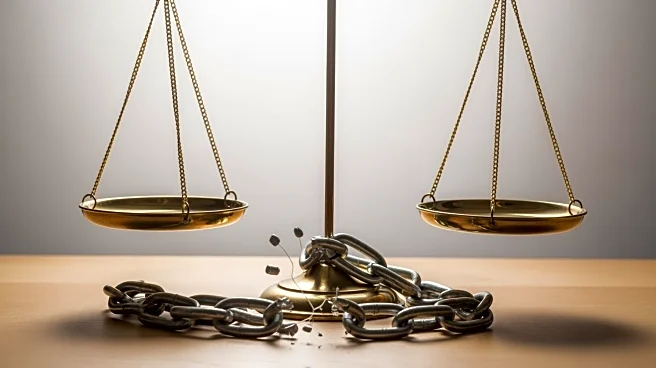What's Happening?
Sam O'Hara, a 35-year-old man, has filed a lawsuit against the District of Columbia and the Ohio National Guard, claiming he was unlawfully detained during a protest. The incident occurred on September
11, when O'Hara played the 'Imperial March' from Star Wars as National Guard members walked through the Logan Circle neighborhood in Washington, D.C. O'Hara used his phone to play the music and recorded the event, which he described as a protest against the National Guard's deployment in the city. According to the lawsuit, a National Guard sergeant threatened to call the police if O'Hara did not stop. Despite this, O'Hara continued, leading to his detention by D.C. police officers. The lawsuit alleges that O'Hara's First and Fourth Amendment rights were violated, as he was handcuffed and detained for 15 to 20 minutes. O'Hara claims the incident caused him physical and emotional distress.
Why It's Important?
This case highlights ongoing tensions between law enforcement and citizens exercising their right to protest. The lawsuit underscores the delicate balance between maintaining public order and respecting constitutional rights. If successful, the lawsuit could set a precedent for how protests are managed, particularly those involving symbolic acts like playing music. The case also raises questions about the role of the National Guard in civilian areas and the potential for overreach. The outcome could influence public policy and law enforcement practices, potentially leading to changes in how protests are policed and how the National Guard is deployed in urban settings.
What's Next?
The lawsuit seeks compensatory and punitive damages, though no specific amount has been set. The case will likely proceed to trial, where evidence will be presented to determine if O'Hara's rights were indeed violated. The defendants, including the four D.C. police officers and the National Guard sergeant, will have the opportunity to respond to the allegations. The trial's outcome could prompt discussions among policymakers and law enforcement agencies about the appropriate response to peaceful protests and the use of force. Public and legal scrutiny may lead to policy reviews and potential reforms in protest management.
Beyond the Headlines
The case also touches on cultural dimensions, as O'Hara's use of the 'Imperial March' from Star Wars adds a layer of symbolic protest. This choice of music, associated with authoritarian figures in popular culture, serves as a critique of the National Guard's presence. The lawsuit may also influence public perception of law enforcement and military presence in civilian life, potentially affecting future protests and civil rights advocacy. The case could inspire similar acts of symbolic protest, challenging authorities to reconsider their responses to non-violent demonstrations.










